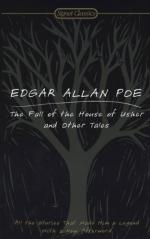|
This section contains 6,893 words (approx. 23 pages at 300 words per page) |

|
SOURCE: “The Power of Terror: Burke and Kant in the House of Usher,” in Poe Studies, Vol. 21, No. 3, December, 1988, pp. 27-35.
In the following essay, Voller contends that “The Fall of the House of Usher” represents a rejection of the theories of sublimity offered by Burke and Kant, and instead focuses on terrors and emotions that could not be easily explained in the context of the optimistic aesthetic proffered by Burke and Kant.
It has been established that Poe's “The Fall of the House of Usher” (1839) is in part a commentary upon the Burkean sublime,1 but the full extent of Poe's critique of sublimity remains to be determined. The tale certainly articulates, as Craig Howes has shown, Poe's dissatisfaction with Burke's silence on certain abstract sources of terror,2 but “Usher” does not rest here in its unsympathetic examination of the sublime. Writing a tale directed against established theories...
|
This section contains 6,893 words (approx. 23 pages at 300 words per page) |

|


